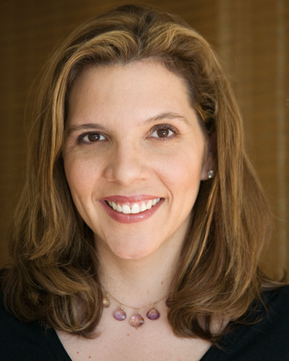BU to Hollywood: Getting to the Top at Grey’s Anatomy
Part one: Screenwriter Krista Vernoff (CFA’93)

Krista Vernoff was perfectly positioned to make a splash in the theater world after earning a B.F.A. in acting at the College of Fine Arts, one of the top-rated conservatory programs in the country. Her family, friends, and classmates assured her that the next step was the New York stage. There was just one problem: she didn’t want to be an actress anymore.
“I had a feeling that I really wanted to be a writer,” says Vernoff (CFA’93). “But there was a lot of peer pressure, and people had this notion that I was probably just scared to go out into the world.”
Scared? Hardly. To get to where she is — head writer and executive producer of the hit television show Grey’s Anatomy — Vernoff took some big risks. She gave up acting, moved to Los Angeles jobless, and turned down a full-time staff writer position on a television show about serial killers. Later, she left a job at Charmed, a successful hour-long drama on the former WB network, when she felt the show’s subtext had shifted from girl power to girls in low-cut shirts. For a self-described hippie who grew up “shoeless on Venice Beach” and had never really watched TV until she was writing for it, Vernoff is deeply aware of the influence her work has on viewers. She doesn’t hesitate to advocate for her characters.
“There’s a huge responsibility,” she says. “You are influencing the minds and hearts of the people who watch your show every week. On Charmed, I didn’t want to say to teenage girls, ‘Your value is in your sex appeal.’”
Vernoff studied playwriting with Jonathan Lipsky, a professor in CFA’s school of theatre, and found that she had a knack for creating funny, vibrant dialogue. Nonetheless, she gamely pursued acting after graduation. She performed in New York and in Portland, Ore., all the while writing screenplays and pilots. She had no doubt that she could act, but eventually decided she was more interested in telling stories on the page than on the stage.
“I felt that I had proven to myself and to my family that I could do it,” Vernoff says. “I loaded up my car and moved to L.A., put my headshots in storage, and never told anyone I was an actor.”
She wrote spec scripts until she got an agent and worked on Time of Your Life, Law and Order, and the short-lived Wonderfalls before getting a three-year contract on Charmed.
When she left the show, Vernoff was dealing with the recent death of her father, and she put her energy into a play about her family. Me, My Guitar, and Don Henley helped vault her on to bigger projects — including Surgeons, the pilot by Shonda Rimes that became Grey’s Anatomy.
After four seasons, Vernoff finds herself at the helm of one of TV’s most popular shows, making sure that the plotlines she oversees live up to her standards. “At Grey’s, we take the medicine very seriously,” she says. “We are very careful not to make it up and offer false hope. Our rule is that the treatment or procedure has to have been successful somewhere in the world for us to put it on TV.” That attention to detail has paid off: Vernoff was nominated for an Emmy for outstanding writing in 2006, for the episode “Into You Like a Train.”
She’s continued to take risks, leaving Grey’s temporarily after the first season to produce the pilot she wrote in her first year in New York. And she’s never really sworn off theater. In 2006, Vernoff staged her play at the city’s 14th Street Y, with the New York Times calling it a “satisfying black comedy with six well-drawn characters.” And in March 2007, she named her new daughter Cosette, after the character in Les Miserables. “I’m still a theater kid,” she says.
Check back tomorrow to read part two of “BU to Hollywood.”
Jessica Ullian can be reached at jullian@bu.edu.
Comments & Discussion
Boston University moderates comments to facilitate an informed, substantive, civil conversation. Abusive, profane, self-promotional, misleading, incoherent or off-topic comments will be rejected. Moderators are staffed during regular business hours (EST) and can only accept comments written in English. Statistics or facts must include a citation or a link to the citation.